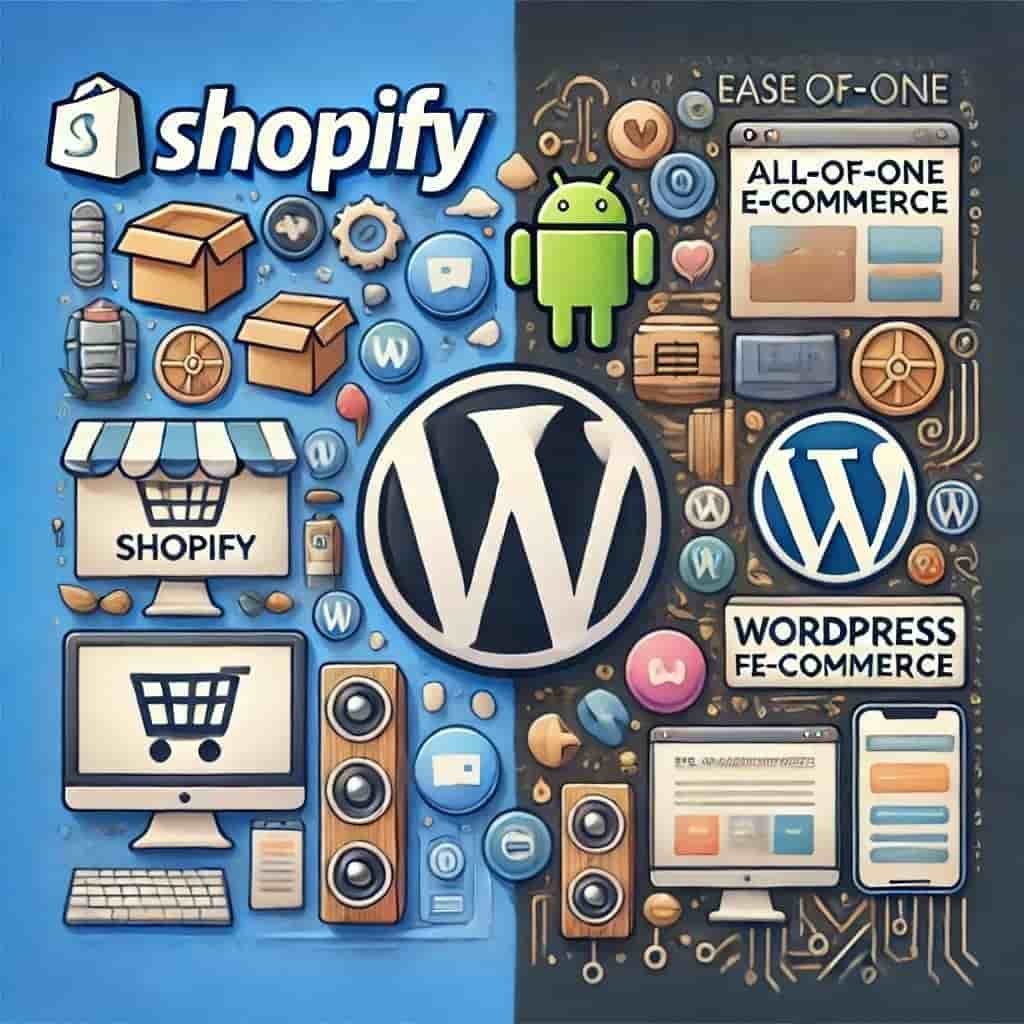
With the advent of the digital era, e-commerce has taken a major leap forward in how businesses are operating these days. For those venturing into online retail, two platforms often stand out and they are Shopify and WordPress with WooCommerce.
To determine which platform provides superior e-commerce solutions, we must consider several variables – including cost, ease of use, and customization.
Simple to Use: How to Create and Run an Internet Store
However, one of the things that makes Shopify so popular is its ease of use – it’s being praised for having an easy, all-in-one type of platform that lets people set up a store without any technical knowledge. Shopify takes care of upgrades, security, and hosting so you can focus on managing your company.
Though slightly more technical, WordPress combined with WooCommerce offers greater flexibility. It is now possible to utilize WordPress as an e-commerce platform since WooCommerce is an extension plugin.
WordPress with WooCommerce provides more control for users; however, it comes at the cost of having to take on your hosting, security and plug-in updates. Technically, this is perfect for tech-savvy people or people who have access to web development services or solutions.
Customization: How Much Control Do You Get?
Customization is a big deal in the case of building an online store. Shopify has many themes and apps, but effective customization is only possible if you know Liquid (Shopify’s templating language). Many store owners are finding Shopify as an app to augment their store’s functionality, but in some cases, it is turning out to be expensive.
On the other hand, WordPress is well known for providing an innumerable variety of customizations. They offer access to thousands of themes and plugins for you to tweak every single area of your website.
WooCommerce is incredibly flexible and with the right set of plugins, you can even build a truly unique shopping experience. WordPress also relies on PHP, which is a more widely known programming language that is easier for customization.
Use SEO Skills to Boost Traffic to Your Store
An essential component of any successful online store is Search Engine Optimization (SEO). Both Shopify and WordPress come equipped with SEO functionality, but because WordPress is a more flexible solution, it wins the race.
One can customize title tags, meta descriptions, and image alt captions, among other built-in SEO capabilities that Shopify provides. Not only does Shopify have clean code, but it also performs well in search engine optimization.
Nevertheless, when it comes to content-rich strategies, Shopify’s blogging functionality is negligible when compared to WordPress and as such; WordPress is the best platform for SEO.
Many plugins handle URL structures, and rich snippets, and help enhance your site speed with caching. Your e-commerce store will benefit from the smooth integration of WordPress with WooCommerce using these SEO plugins in terms of organic traffic.
Scalability: Growing with Your Business
One of the crucial questions e-commerce store owners need to factor in when running their sites is scalability. Your platform, too, should grow as your business does. As a hosted solution provider – Shopify scales as you grow because Shopify takes care of server management so that your store stays fast and secure.
Shopify gets more expensive as you add more features and bump up bandwidth. However, with WordPress, it’s in your hands. WordPress is an open-source platform which means you do not need to worry about your costs rising every month for scaling your website.
As your e-commerce business eventually grows, you will need to manage your hosting and make sure your site remains fast and secure. If you want to succeed with your site, you need to choose the right hosting provider to optimize your site’s performance.
Cost: Understanding the Investment
When comparing Shopify and WordPress, cost is an important factor. With prices starting at $39 per month, Shopify is based on a subscription model. Shopify offers hosting, security, and e-commerce solutions for a fee. In case you want your store to come up with greater capabilities, you will require purchasing extra apps that cost up. Shopify also levies transaction fees if you choose not to use Shopify Payments.
On the contrary, you can use WordPress with a WooCommerce plug-in, but that too has associated costs. Additionally, you will need to pay a few rupees per month for hosting to maintain your store online. Furthermore, premium plugins, themes, and security upgrades could cost money. While at first glance WordPress may seem cheaper, the total cost can vary depending on your store’s needs.

Payment Gateways: Supporting the Options You Want
Multiple payment gateways can either make or break your online store. On top of being able to accept Shopify payments, Shopify also works with over 100 additional payment gateways. Shopify charges extra transaction costs (up to 2%) if you choose not to utilize Shopify Payments, however, this flexibility is still amazing.
In comparison, WooCommerce works on custom shipping methods and numerous payment gateways where additional transaction fees are not built in. You can add popular gateways like PayPal, Stripe, and Square to your WooCommerce store. As such, it makes WooCommerce more attractive with a high volume of transactions or using a lot of payment methods.
Security: Keeping Your Store Safe
If you are running an e-commerce store, security should be your top priority. Shopify is a hosted platform so there’s already all the security taken care of, such as SSL certificates, PCI compliance, and regular updates. Shopify also gives you 24/7 customer support, which can be particularly valuable in case of a security breach.
WordPress itself is secure, but it’s up to you to get a security plug-in installed, have SSL certificates, and make sure your hosting provider is PCI compliant. But plugins like Wordfence and Sucuri Security can help add some protection to your WordPress site as it is a matter of security management and oversight.
Forums and Guidance: Getting Help When You Need It
Despite having sizable communities, Shopify and WordPress offer somewhat different types of assistance. You may reach Shopify’s customer service representatives by phone, chat, or email around the clock.
Shopify’s reputation for quickly and helpfully answered questions — even for nontechnical e-commerce store owners has a reputation of being one of the simplest ways to get support.
The good thing about WordPress being an open-source platform is that they don’t offer direct customer support. Instead, it relies on its vast user community, forums, and tutorials.
But despite this, many third-party developers provide premium support and maintenance services for WooCommerce users. WordPress might be a good choice if you are comfortable with the DIY (do-it-yourself) approach, and are familiar with doing research in forums and reading posts.
Apps and Plugins: Expand Your Store’s Potential
Massive app and plugin libraries are available for both Shopify and WordPress that can improve the functionality of your store. Shopify offers approximately 6,000 apps in its app store, including solutions for marketing, and inventory control. While most of these apps are very easy to install, they also frequently require you to pay a recurring service fee, thereby increasing your overall cost.
On the other hand, WordPress comes with over 55,000 plugins, and the vast majority cost either nothing or a one-time fee. There are plenty of extensions available from WooCommerce to manage everything from taxes, shipping, and memberships down to subscriptions, etc.
Although having many plugins offers you control over the entire website, you still need to be careful about the plugins you install because poorly designed plugins might cause your eCommerce site to lag or crash.
Conclusion: What Platform Is Best for You?
Choosing Shopify or WordPress boils down to which one meets your business’s needs, your technical abilities, and the long-term goals you have. Shopify handles all your buying and marketing needs, making it the ideal option if you’re searching for a straightforward, hassle-free approach to launching an online store.
For enterprises that do not want to spend weeks creating and establishing their e-commerce website, Shopify is the perfect platform. Just make a few simple adjustments, and you won’t have to bother about hosting or security.
Shopify is a great option for small and medium-scale enterprises seeking simplicity due to its user-friendly interface and excellent customer support.
Alternatively, if you’re looking for complete freedom and flexibility over your e-commerce store, WordPress with WooCommerce stands above the rest. It offers endless customization options, provides superior SEO capabilities, and no-cost platform fees or transaction fees for businesses with special needs. The needs of your e-commerce firm will determine which platform is best for you.
As a business organization, you need to think about your budget, technical proficiency, and the aims and objectives of your e-commerce business before deciding between Shopify and WordPress. Knowing the benefits and drawbacks of utilizing WordPress and Shopify as your eCommerce platform is crucial.
However, it will ultimately depend upon your business objectives when it comes down to choosing between Shopify or WordPress as your e-commerce platform.